The Wholesome Journey - Group Nutrition Coaching Program
Mentorship Program, 1:1 Nutrition Coaching with Alison
What do you want to learn more about?
Program Login
Podcast Features
June 7, 2018
Alison Tierney, MS, RD, CD, CSO
Alison is a registered dietitian, board-certified in oncology nutrition, and a cancer thriver. Her expertise in oncology nutrition and personal experience with her own cancer diagnosis and its treatment provide her with the unique perspective of being able to relate to her clients on an entirely different level. Her content is consistently focused on evidence-based guidelines and seeks to increase the awareness of the power of nutrition to complement traditional cancer therapies.
- Alison Tierney, MS, RD, CD, CSO
- Alison Tierney, MS, RD, CD, CSO
- Alison Tierney, MS, RD, CD, CSO
- Alison Tierney, MS, RD, CD, CSO
- Alison Tierney, MS, RD, CD, CSO
- Alison Tierney, MS, RD, CD, CSO
- Alison Tierney, MS, RD, CD, CSO
- Alison Tierney, MS, RD, CD, CSO
- Alison Tierney, MS, RD, CD, CSO
- Alison Tierney, MS, RD, CD, CSO
- Alison Tierney, MS, RD, CD, CSO
- Alison Tierney, MS, RD, CD, CSO
- Alison Tierney, MS, RD, CD, CSO
- Alison Tierney, MS, RD, CD, CSO
- Alison Tierney, MS, RD, CD, CSO
- Alison Tierney, MS, RD, CD, CSO
- Alison Tierney, MS, RD, CD, CSO
- Alison Tierney, MS, RD, CD, CSO
- Alison Tierney, MS, RD, CD, CSO
- Alison Tierney, MS, RD, CD, CSO
- Alison Tierney, MS, RD, CD, CSO
- Alison Tierney, MS, RD, CD, CSO
- Alison Tierney, MS, RD, CD, CSO
- Alison Tierney, MS, RD, CD, CSO
- Alison Tierney, MS, RD, CD, CSO
- Alison Tierney, MS, RD, CD, CSO
- Alison Tierney, MS, RD, CD, CSO
- Alison Tierney, MS, RD, CD, CSO
- Alison Tierney, MS, RD, CD, CSO
- Alison Tierney, MS, RD, CD, CSO
- Alison Tierney, MS, RD, CD, CSO
- Alison Tierney, MS, RD, CD, CSO
- Alison Tierney, MS, RD, CD, CSO
- Alison Tierney, MS, RD, CD, CSO
- Alison Tierney, MS, RD, CD, CSO
- Alison Tierney, MS, RD, CD, CSO
- Alison Tierney, MS, RD, CD, CSO
- Alison Tierney, MS, RD, CD, CSO
- Alison Tierney, MS, RD, CD, CSO
- Alison Tierney, MS, RD, CD, CSO
- Alison Tierney, MS, RD, CD, CSO
- Alison Tierney, MS, RD, CD, CSO
- Alison Tierney, MS, RD, CD, CSO
- Alison Tierney, MS, RD, CD, CSO
- Alison Tierney, MS, RD, CD, CSO
- Alison Tierney, MS, RD, CD, CSO
- Alison Tierney, MS, RD, CD, CSO
- Alison Tierney, MS, RD, CD, CSO
- Alison Tierney, MS, RD, CD, CSO
- Alison Tierney, MS, RD, CD, CSO
- Alison Tierney, MS, RD, CD, CSO
- Alison Tierney, MS, RD, CD, CSO
- Alison Tierney, MS, RD, CD, CSO
- Alison Tierney, MS, RD, CD, CSO
- Alison Tierney, MS, RD, CD, CSO
- Alison Tierney, MS, RD, CD, CSO
- Alison Tierney, MS, RD, CD, CSO
- Alison Tierney, MS, RD, CD, CSO
- Alison Tierney, MS, RD, CD, CSO
- Alison Tierney, MS, RD, CD, CSO
- Alison Tierney, MS, RD, CD, CSO
- Alison Tierney, MS, RD, CD, CSO
- Alison Tierney, MS, RD, CD, CSO
- Alison Tierney, MS, RD, CD, CSO
- Alison Tierney, MS, RD, CD, CSO
- Alison Tierney, MS, RD, CD, CSO
- Alison Tierney, MS, RD, CD, CSO
- Alison Tierney, MS, RD, CD, CSO
- Alison Tierney, MS, RD, CD, CSO
- Alison Tierney, MS, RD, CD, CSO
- Alison Tierney, MS, RD, CD, CSO
- Alison Tierney, MS, RD, CD, CSO
- Alison Tierney, MS, RD, CD, CSO
- Alison Tierney, MS, RD, CD, CSO
- Alison Tierney, MS, RD, CD, CSO
- Alison Tierney, MS, RD, CD, CSO
- Alison Tierney, MS, RD, CD, CSO
- Alison Tierney, MS, RD, CD, CSO
- Alison Tierney, MS, RD, CD, CSO
- Alison Tierney, MS, RD, CD, CSO
- Alison Tierney, MS, RD, CD, CSO
- Alison Tierney, MS, RD, CD, CSO
- Alison Tierney, MS, RD, CD, CSO
- Alison Tierney, MS, RD, CD, CSO
- Alison Tierney, MS, RD, CD, CSO
- Alison Tierney, MS, RD, CD, CSO
- Alison Tierney, MS, RD, CD, CSO
- Alison Tierney, MS, RD, CD, CSO
- Alison Tierney, MS, RD, CD, CSO
- Alison Tierney, MS, RD, CD, CSO
- Alison Tierney, MS, RD, CD, CSO
- Alison Tierney, MS, RD, CD, CSO
- Alison Tierney, MS, RD, CD, CSO
- Alison Tierney, MS, RD, CD, CSO
- Alison Tierney, MS, RD, CD, CSO
- Alison Tierney, MS, RD, CD, CSO
- Alison Tierney, MS, RD, CD, CSO
- Alison Tierney, MS, RD, CD, CSO
- Alison Tierney, MS, RD, CD, CSO
- Alison Tierney, MS, RD, CD, CSO
- Alison Tierney, MS, RD, CD, CSO
- Alison Tierney, MS, RD, CD, CSO
- Alison Tierney, MS, RD, CD, CSO
- Alison Tierney, MS, RD, CD, CSO
- Alison Tierney, MS, RD, CD, CSO
- Alison Tierney, MS, RD, CD, CSO
- Alison Tierney, MS, RD, CD, CSO
- Alison Tierney, MS, RD, CD, CSO
- Alison Tierney, MS, RD, CD, CSO
- Alison Tierney, MS, RD, CD, CSO
- Alison Tierney, MS, RD, CD, CSO
- Alison Tierney, MS, RD, CD, CSO
- Alison Tierney, MS, RD, CD, CSO
- Alison Tierney, MS, RD, CD, CSO
- Alison Tierney, MS, RD, CD, CSO
- Alison Tierney, MS, RD, CD, CSO
- Alison Tierney, MS, RD, CD, CSO
- Alison Tierney, MS, RD, CD, CSO
- Alison Tierney, MS, RD, CD, CSO
- Alison Tierney, MS, RD, CD, CSO
- Alison Tierney, MS, RD, CD, CSO
- Alison Tierney, MS, RD, CD, CSO
- Alison Tierney, MS, RD, CD, CSO
“If I had to share one thing that I learned in my past 4.5 years living with an autoimmune disease it is as simple as this: it’s all about controlling inflammation.” ~Lauren
Before we dive in, we don’t want to give inflammation a bad rap, because it is a critical defense mechanism and heals us from within. It is a natural response. The right kind of inflammation helps damaged cells and fights viruses and bacteria. But it is important to know, there are two types of inflammation:
Acute Inflammation:
An example is getting a cut on your hand, it bleeds, the surrounding tissue turns red and becomes inflamed. This is your body’s natural response to help heal the cut.
Chronic inflammation:
This is when inflammation continues and its onset is slow. Typically resulting from poor diet, physical inactivity, overactive immune responses, or invaders to the body the body cannot get rid of.
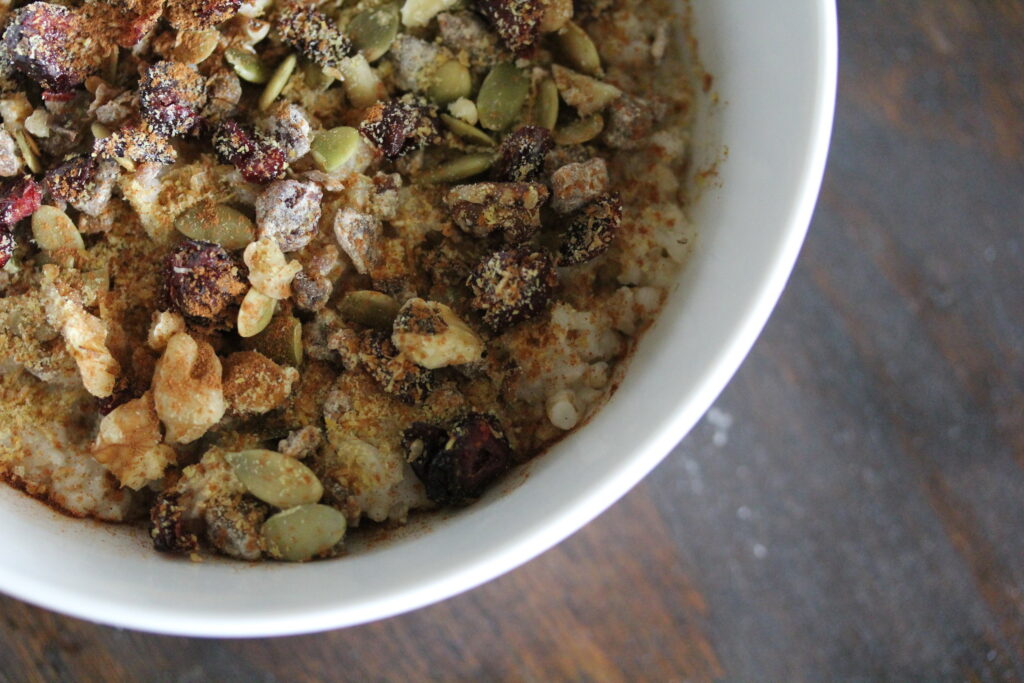
Chronic inflammation has been identified as the root cause for many diseases, including but not limited to:
- Asthma
- Alzheimer’s disease
- Cancer
- Cardiovascular disease
- Diabetes
- High blood pressure
- High cholesterol
- Parkinson’s disease
You may have noticed lupus is not listed. That is because autoimmune diseases are slightly different. “At their root they are connected by one central biochemical process: A runaway immune response also known as systemic inflammation that results in your body attacking its own tissues.” (1) Essentially, this means your immune system can’t properly determine the good cells from the bad, so it turns on inflammation as a defense. The chronic inflammation puts everyone who has an autoimmune disease at risk for all of the diseases listed above. Yikes.
Once it is all said and done, most doctors just manage the list of diseases above with medications. Notice how we said ‘manage’ and nothing about trying to reverse the disease? Would you rather reverse a disease instead of just manage it? Us too. That is why we are BOTH on a journey to reverse Lauren’s lupus and prevent both of us from chronic disease.
One question you may be asking is, what is causing all of this inflammation? Why is it happening in the first place? There are many, many factors that cause inflammation. But we’ll discuss that in next week’s post. We like to focus on the good stuff first!
While there is still plenty of research that needs to be done, there is a lot we already know about reducing the risk of inflammation. A major piece of the puzzle is eating a variety of foods that have anti-inflammatory and antioxidant properties. Why antioxidant properties? Because they are known to attack inflammation and inflammatory diseases at their source.
There are handfuls of foods that help, but we picked our top 5 based on how easy they are to add to your diet and their overall benefits.
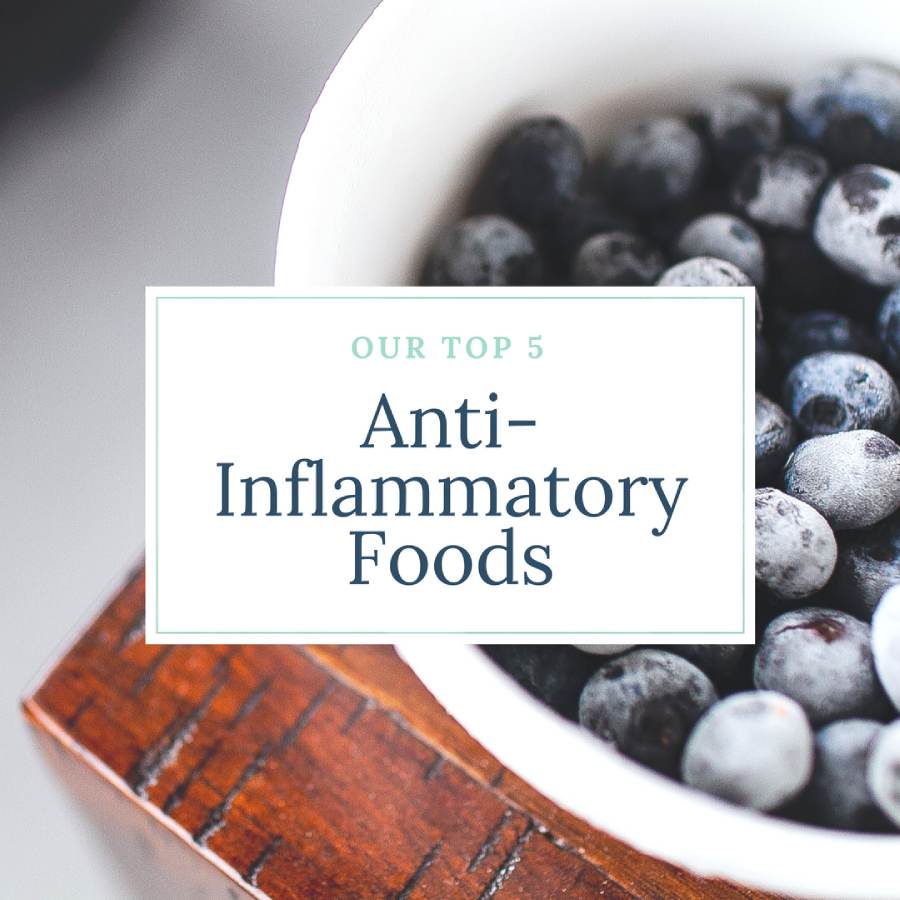
1. Dark-Green, Leafy Vegetables
According to many experts, dark-green, leafy vegetables (or, “greens”) are considered the healthiest foods on the planet, as they offer the most nutrients per calorie. Greens are associated with the strongest protection against chronic diseases (2), including 20% reduction in risk for heart attacks (3) and strokes (4) for every daily serving. Plus, they are rich in antioxidants that restore cellular health, as well as anti-inflammatory flavonoids.
Nutrition Prescription: Aim to have a minimum of 1 serving per day–which is equal to 1 cup. For ultimate health, aim for 2 servings per day.
Tips: Add a large handful of spinach to a smoothie; consume a daily salad (try our Almond Caesar Dressing!), eat meals over a bed of lettuce; add wilted greens to soups, casseroles, and other dishes.
2. Turmeric
There has been a lot of information about turmeric and its health benefits. In recent years, more than 5,000 studies have been published on turmeric. Turmeric’s primary compound, curcumin, is its active anti-inflammatory component and is considered one of the most powerful anti-inflammatory components in the world. There is so much research regarding turmeric and its benefits that it has to be its own blog post–more to come!
To give you a little taste of how amazing turmeric is, research shows turmeric can beneficial in preventing or treating:
- Lung Disease (5)
- Brain Disease (5)
- Variety of Cancers, including: multiple myeloma, colon cancer, and pancreatic cancer (5)
- Rheumatoid Arthritis (6)
- Osteoarthritis (7)
- Lupus (8)
- Inflammatory Bowel Disease (9)
- …the list goes on!
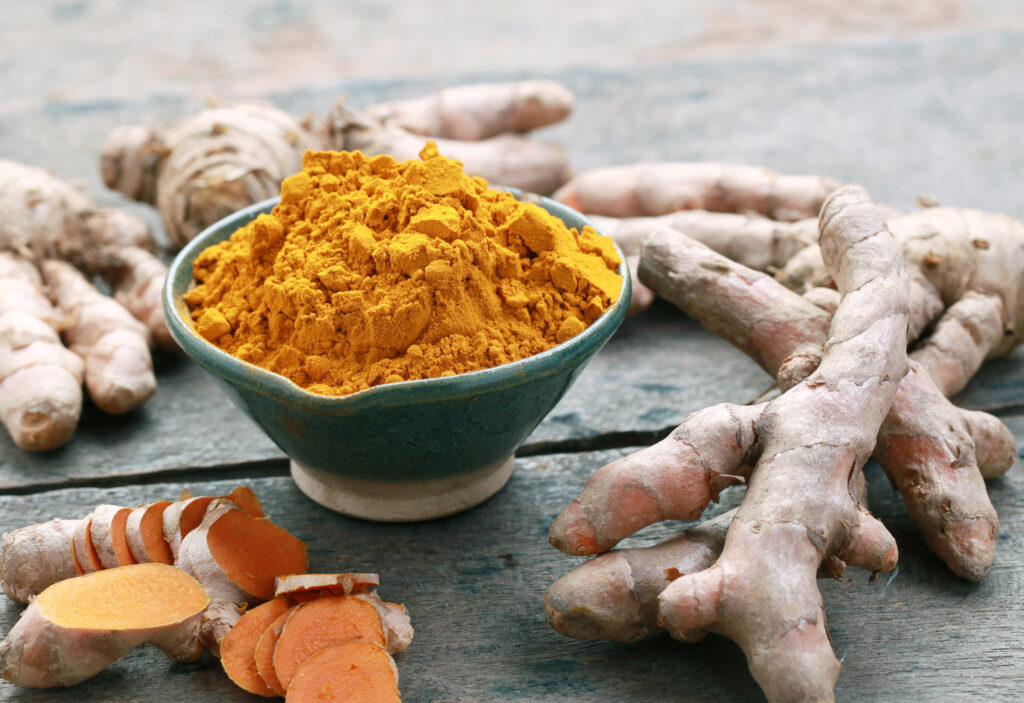
Nutrition Prescription: Aim to consume at least ¼ teaspoon of ground turmeric daily. Be sure to add at least a pinch of black pepper, which enhances the bioavailability (or, the body’s ability to utilize) of the turmeric by up to 2,000%!
Tips: Try sprinkling turmeric on avocado toast, adding to soups, or even adding it to a smoothie! Just a heads up, turmeric will turn your dish yellow.
To learn more about turmeric, check out our blog post ‘Benefits of Turmeric + How to Make Your Own Capsules’.
3. Flaxseed
The word “superfood” comes to mind every time we consume flaxseeds. Why? Because they are an excellent source of omega-3s (anti-inflammatory!) and phytonutrients (cancer fighters!). Specifically, flax contains the phytonutrient lignan, which is a chemical compound protecting blood vessels from inflammatory damage (10). Another thing we love about flaxseeds is they have been found to lower LDL (“bad) cholesterol and thus, reduce your risk of heart disease.
To maximize the benefits of flaxseeds, it is important to use ground flaxseeds over full seeds and oil. If you digest the full seed, it simply passes through your digestive tract and your body won’t be able to absorb its amazing benefits.
Nutrition Prescription: Aim to consume 1 tablespoon of ground flaxseed daily.
Tips: Add it to soups, muffins, breads, salads and even sprinkle it on peanut butter toast.
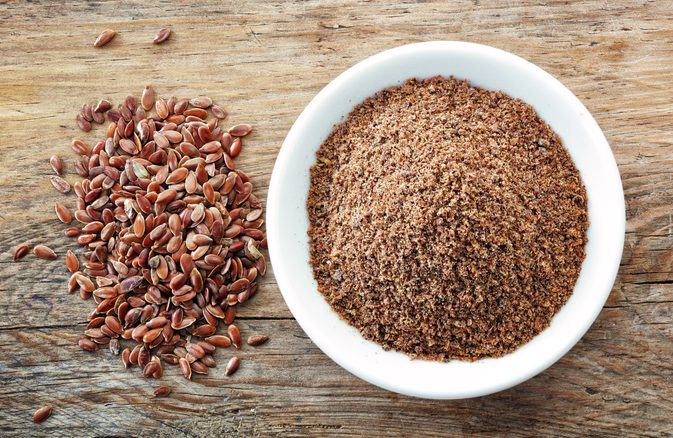
4. Oats
Oats contain a unique class of antioxidants called avenanthramides which is found to lower blood pressure and have anti-inflammatory properties (4). Have you ever heard of oatmeal baths? We both remember taking oat baths when we had the chickenpox. Why? Because avenanthramides have also been shown to relieve skin itching and irritation effects (11, 12).
Nutrition Prescription: We don’t have a specific recommendation for how often to consume oats, however, aiming to consume at least 3 servings per day of whole grains can have wonderful health benefits. One-half cup of oatmeal equals 1 serving.
Tips: Try our Simple Overnight Oats or Oatmeal Cookie Energy bites!
5. Berries
Dark-green, leafy vegetables may be the healthiest vegetable on the planet, but berries are are most certainly the healthiest fruits. This is because berries rank as some of the highest foods in terms of their antioxidant power, which is measured in units. For reference, apples contain about 60 units, whereas bananas contain 40 units of antioxidants. But berries–berries contain much more! Per cup, strawberries contain 310 units, cranberries 330 units, raspberries 350 units, blueberries 380 units, and blackberries 650 units! (13) The tremendous amount of antioxidants and phytochemicals in berries is what makes these fruits powerful against inflammation.
Nutrition Prescription: Aim to consume at least 1 serving per day of any berry. Again, 1 serving is equal to ½ cup fresh or frozen, or ¼ cup dried.
Tips: Top our Easy Weekend Pancakes or Simple Overnight Oats with your favorite berry. Or, berries make a perfect snack all on their own!
————————-
There you have it, some of our top anti-inflammatory foods!
Whether you are already living with a chronic disease or doing everything in your power to reduce your risk of disease, we hope you can include anti-inflammatory foods in your diet. Next week we’ll dive into which foods are known to cause inflammation and how to reduce your consumption of those pro-inflammatory foods.
But for now…
Let us know, do you love any of the foods we listed above? If so, what recipe do you use them in? Comment below!
a l i s o n & ❤️l a u r e n
References:
- Hyman, Mark. “How to Stop Attacking Yourself: 9 Steps to Heal Autoimmune Disease.” Dr. Mark Hyman, 14 June 2016, drhyman.com/blog/2010/07/30/how-to-stop-attacking-yourself-9-steps-to-heal-autoimmune-disease/.
- Hung HC, Joshipura KJ, Jiang R, et al. Fruit and vegetable intake and risk of major chronic disease. J Natl Cancer Inst. 2004;96(21):1577-84.
- Joshipura KJ, Hu FB, Manson JE, et al. The effect of fruit and vegetable intake on risk for coronary heart disease. Ann Intern Med. 2001;134(12):1106-14.
- Joshipura KJ, Ascherio A, Manson JE, et al. Fruit and vegetable intake in relation to risk of ischemic stroke. JAMA. 1999;282(13):1233-9.
- Greger, Michael, and Gene Stone. How Not to Die: Discover the Foods Scientifically Proven to Prevent and Reverse Disease. Flatiron, 2015;351, 377.
- Chandran B, Goel A. A randomized, pilot study to assess the efficacy and safety of curcumin in patients with active rheumatoid arthritis. Phytother Res. 2012;26(11):1719-25.
- Kuptniratsaikul V, Dajpratham P, Taechaarpornkul W, et al. Efficacy and safety of Curcuma domestica extracts compared with ibuprofen in patients with osteoarthritis: a multicenter study. Clin Interv Aging. 2014;9-451-8.
- Khajehdehi P, Zanjaninejab B, Aflaki E, et al. Oral supplementation of turmeric decreases proteinuria, hematuria, and systolic blood pressure in patients suffering from relapsing or refractory lupus nephritis: a randomized and placebo-controlled study. J Ren Nutr. 2012;22(1):50-7.
- Vecchi Brumatti L, Marcuzzi A, Tricario PM, Zanin V, Girardelli M, Biano AM. Curcumin and inflammatory bowel disease: potential and limits of innovative treatments. Molecules. 2014;19(12):21127-53.
- Sherzai, Dean, and Ayesha Sherzai. The Alzheimers Solution: a Breakthrough Program to Prevent and Reverse the Symptoms of Cognitive Decline at Every Age. HarperOne, 2017;96.
- Palsdottir, Hrefna. “9 Health Benefits of Eating Oats and Oatmeal.” Healthline, Healthline Media, 19 July 2016, www.healthline.com/nutrition/9-benefits-oats-oatmeal.
- Cerio R, Dohil M, Downie J, et al. Mechanism of action and clinical benefits of colloidal oatmeal for dermatologic practice. J Drugs Dermatol. 2010;9(9):1116-20.
- Carlsen MH, Halvorsen BL, Holte K, et al. The total antioxidant content of more than 3100 foods, beverages, spices, herbs and supplements used worldwide. Nutr J. 2010;9:3.
Our Top 5 Anti-Inflammatory Foods
Leave a Reply Cancel reply
Featured Articles
Wholesome LLC is not a medical practice, and its employees cannot offer medical advice. This website provides educational information but it is not a substitute for medical advice from a licensed medical professional who is familiar with your particular facts and circumstances. The information contained on this website is not intended to diagnose, treat, or cure any disease and shall not be construed as medical advice. The information and education on this website is provided for you to use at your own discretion.
You can further review our disclaimer here.
Wholesome
About Alison
Courses & Programs
The Wholesome Journey
Free Resources
FAQs
Press & Media
Recipes
Blog
Contact Us
Shop
© 2026 Wholesome, LLC All rights reserved.
Privacy Policy
Terms of Use
Disclaimer
Mobile Terms of Service
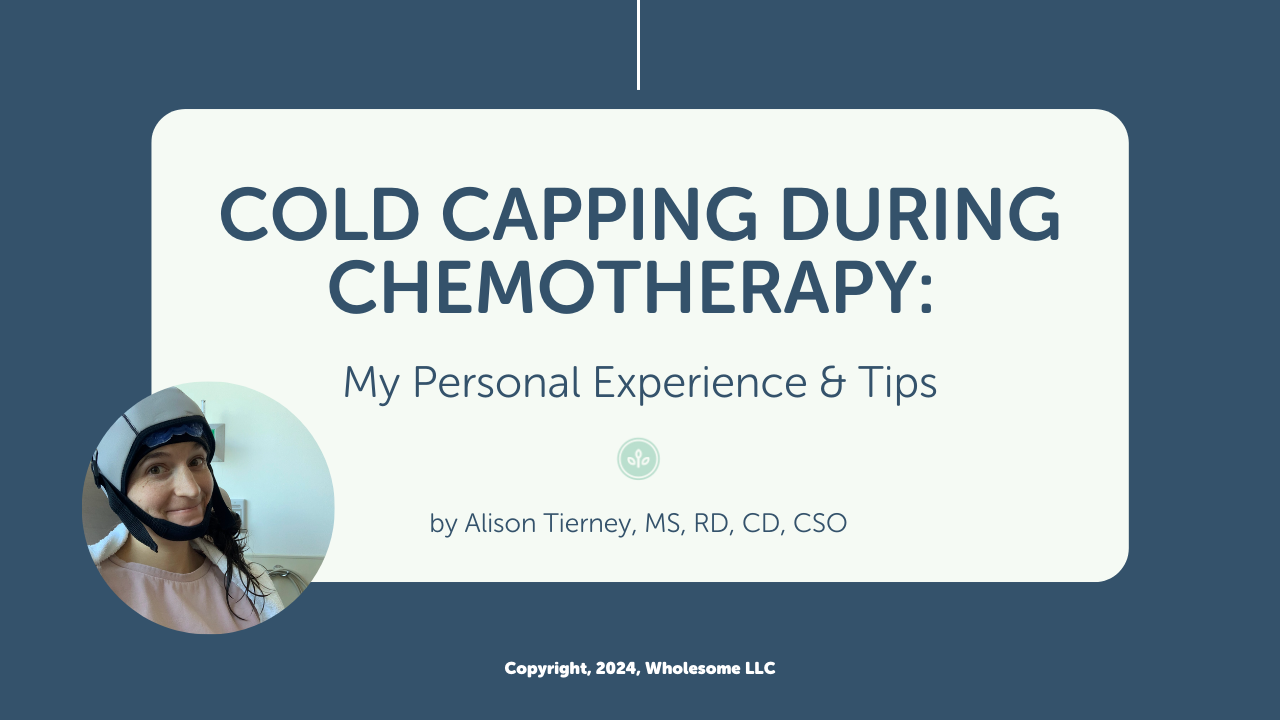

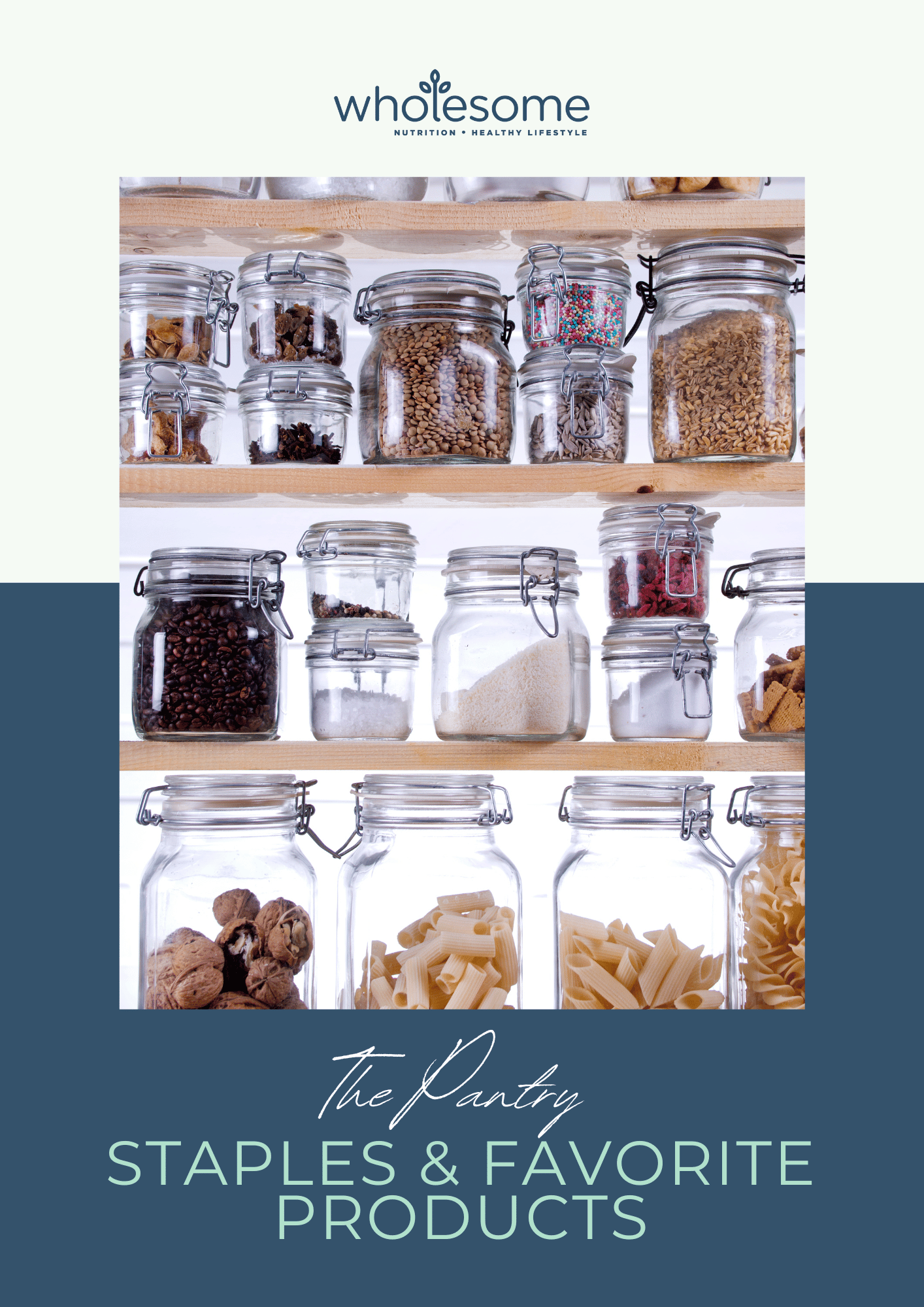
Be the first to comment